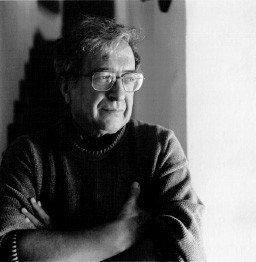American composer Tom Myron was born November 15, 1959 in Troy, NY. His compositions have been commissioned and performed by the Kennedy Center, the United States Holocaust Memorial Museum, the Portland Symphony Orchestra, the Eclipse Chamber Orchestra, the Atlantic Classical Orchestra, the Eastern Connecticut Symphony Orchestra, the Topeka Symphony, the Yale Symphony Orchestra, the Civic Orchestra of Chicago, the Bangor Symphony and the Lamont Symphony at Denver University.
He works regularly as an arranger for the New York Pops at Carnegie Hall, writing for singers Rosanne Cash, Kelli O'Hara, Maxi Priest & Phil Stacey, the Young People's Chorus of New York City, the band Le Vent du Nord & others. His film scores include Wilderness & Spirit; A Mountain Called Katahdin and the upcoming Henry David Thoreau; Surveyor of the Soul, both from Films by Huey.
Individual soloists and chamber ensembles that regularly perform Myron's work include violinists Peter Sheppard-Skaerved, Elisabeth Adkins & Kara Eubanks, violist Tsuna Sakamoto, cellist David Darling, the Portland String Quartet, the DaPonte String Quartet and the Potomac String Quartet.
Tom Myron's Violin Concerto No. 2 has been featured twice on Performance Today. Tom Myron lives in Northampton, MA. His works are published by MMB Music Inc.
FREE DOWNLOADS of music by TOM MYRON
Symphony No. 2
Violin Concerto No. 2
Viola Concerto
The Soldier's Return (String Quartet No. 2)
Katahdin (Greatest Mountain)
Contact featuring David Darling
Mille Cherubini in Coro featuring Lee Velta
This Day featuring Andy Voelker
|
|
|
|
| 
Monday, October 03, 2005
Rose de sang

I consider Luciano Berio to be the finest of the generation of European composers that came of age in the years following WW II. I believe that many years from now his work will be heard as the embodiement of a massive transition not from Modernism to Post-Modernism but from Romanticism to where we are now, a transition similar to the Classical/Romantic divide that Beethoven's output occupies.
Luciano Berio would have been 80 this month.
"There is a great deal of mystery around us. Romantic man was surrounded by a mysterious and impassive nature. Today, man is surrounded by an equally mysterious and substantially malign culture: a culture that, both on a planetary and a local level, often presents itself as a very unstable and dangerous emulsion of transformations, oppressions and (often mishandled) skirmishes- with few prospects for an amalgam. ...If this emulsion one day "precipitates" and explodes, we should at least be able to offer- to those that come after us, God knows how and god knows from where- real and historically responsible things and not false things, unworthy of memory."
Luciano Berio
1983
posted by Tom Myron
|
| |



